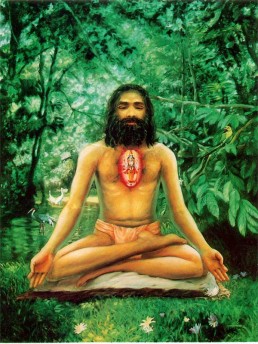Swami Chinmayananda
Swami Chinmayananda Commentary
Adi Sankara Commentary
Yatra, at the time when; cittam, the mind; niruddham, restrained, entirely prevented from wandering; uparamate, gets withdrawn; yoga-sevaya, through the practice of Yoga; ca, and; yatra eva, just when, at the very moment when; pasyan, by seeing, by experiencing; atmanam, the Self, which by nature is the supreme light of Consciousness; atmana, by the self, by the mind purified by concentration; tusyati, one remains contented, gets delighted; atmani eva, in one’s own Self alone-. [Samadhi is of two kinds, Samprajnata and Asamprajnata. The concentration called right knowledge (Samprajnata) is that which is followed by reasoning, discrimination, blisss and unqualified egoism. Asamprajnata is that which is attained by the constant practice of cessation of all mental activity, in which the citta retains only the unmanifested impressions.-Cf. C. W., Vol. I, 1962, pp. 210, 212. According to A.G. the verses upto 6.20 state in a general way the characteristics of samadhi. From the present verse to the 25th, Asamprajnata-samadhi is introduced and defined.-Tr.] Besides,/p>p>6.21 Yatra, when, at the time when; vetti, one experiences; tat, that; atyantikam, absolute-which is verily limitless, i.e. infinite; sukham, Bliss; yat, which; buddhi-grahyam, can be intuited by the intellect, intuited by the intellect alone, without the help of the senses; and which is atindriyam, beyond the senses, i.e. not objective; (-when one experieneces this kind of Bliss) and sthitah, being established in the nature of the Self; ayam, this person, the illumined one; eva, surely; na calati, does not swerve; tattvatah, from that Reality-i.e. does not deviate from the nature of Reality-. Further,/p>p>6.22 Labdhva, obtaining; yam, which-by acquiring which Self-attainment; na manyate, one does not think; that there is aparam, any other; labham, acquisition; tatah adhikam, superior to that; and also, sthitah,being established; yasmin, in which Reality of the Self; na vicalyate, one is not perturbed; api, even; guruna, by great; duhkhena, sorrow, as may be caused by being struck with weapons, etc.-. The yoga that has been spoken of as a particular state of the Self, distinguished by its characterisics in the verses beginning with ‘At the time when the mind gets withdrawn,’ (20) etc.-/p>p>6.23 Vidyat, one should know; tat, that; duhkha-samyoga-viyogam, severance (viyoga) of contact (samyoga) with sorrow (duhkha); to be verily yoga-sanjnitam, what is called Yoga-i.e. oen should know it through a negative definition. After concluding the topic of the result of Yoga, the need for pursuing Yoga is again being spoken of in another way in order to enjoin ‘preservance’ and ‘freedom from depression’ as the disciplines for Yoga: Sah, that; yogah, Yoga, which has the results as stated above; yoktavyah, has to be practised; niscayena, with perservance; and anirvinnacetasa, with an undepressed heart. That which is not (a) depressed (nirvinnam) is anirvinnam. What is that? The heart. (One has to practise Yoga) with that heart which is free from depression. This is the meaning. Again,
The Bhagavad Gita with the commentary of Sri Sankaracharya – Translated by Alladi Mahadeva Sastry
Holy Geeta – Commentary by Swami Chinmayananda
The Bhagavad Gita by Eknath Easwaran – Best selling translation of the Bhagavad Gita
The Bhagavad Gita – Translation and Commentary by Swami Sivananda
Bhagavad Gita – Translation and Commentary by Bhaktivedanta Swami Prabupadha
Srimad Bhagavad Gita Chapter 6 – Verse 20 – 6.20 yatroparamate cittam – All Bhagavad Gita (Geeta) Verses in Sanskrit, English, Transliteration, Word Meaning, Translation, Audio, Shankara Bhashya, Adi Sankaracharya Commentary and Links to Videos by Swami Chinmayananda and others – 6-20

